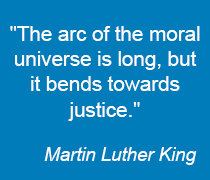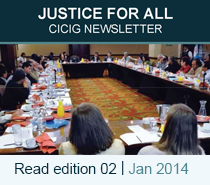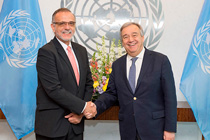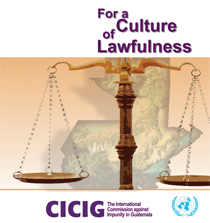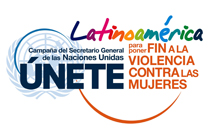 Guatemala, March 25, 2011. A number of former presidents around the world have been sentenced on charges of corruption, illicit enrichment, and fundamental rights violations, and there are other presidents currently being prosecuted.
Guatemala, March 25, 2011. A number of former presidents around the world have been sentenced on charges of corruption, illicit enrichment, and fundamental rights violations, and there are other presidents currently being prosecuted.
The majority of these former presidents were elected by people seeking change for their country. However, these same individuals—after learning that their president had become rich and commited crimes and fraud acts—now seek justice, even though they had previously supported their leader.
There are multiple examples of former presidents that deceived their people, as well as cases in which the justice system has achieved their imprisonment.
The former President of Peru (1990-2000), Alberto Fujimori, is an example of a former leader who has been convicted. Fujimori was sentenced in April 2009 to 25 years in prison on charges of corruption and human rights violations. On July 20, 2009 Fujimori was sentenced to an additional seven and a half years in prison, after being convicted of embezzlement, misappropriation of funds and falsification of facts.
Convicted former presidents
The former presidents convicted in the courts of their country on charges of corruption or fundament rights violations include:
- Alberto Fujimori (1990-2000), Peru, 25 years in prison.
- Rafael Ángel Calderón (1990-1994), Costa Rica, 5 years in prison.
- Arnoldo Alemán Lacayo (1997 to 2002), Nicaragua, 20 years in prison.
- Luis García Meza (1980-1981), former Bolivian dictator, 200 years in prison.
- Carlos Andrés Pérez (1974-1979 and 1989-1993), Venezuela, 2 years and 4 months in prison.
- Luis Ángel González Mácchi (1999-2003), Paraguay.
- Fernando Collor de Mello (1990-1992), Brasil. Congress disqualified him from holding public office for eight years, beginning in 1994.
- Chun Doo-Hwan (1980-1988), South Korea, sentenced to death, but the sentence was later changed.
- Moussa Traoré, Republic of Mali (1968-1979), sentenced to death, but the sentence was later changed.
On October 5, the former President of Costa Rica, Rafael Ángel Calderón, who held office from 1990 to 1994, was sentenced to 5 years in prison for embezzlement. He was tried on charges of receiving illegal payments, after being granted a USD 39.5 million loan by the Government of Finland. The Costa Rica Social Security Fund (CCSS) used the loan to purchase medical equipment from a company that distributed pharmaceutical products.
Arnoldo Alemán Lacayo, President of Nicaragua from 1997 to 2002, was sentenced to 20 years in prison in 2003 for defrauding the State and committing other acts of corruption, but the trial court granted him the right to serve his sentence at home. The Constitutional Chamber of the Supreme Court of Justice subsequently cleared him of all charges.
The former Bolivian dictator, Luis García Meza, who ruled from 1980 to 1981, was sentenced (in absentia) in 1993 to more than 200 years in prison for crimes against humanity. García Meza has been imprisoned since March 15, 1995, when he was extradited from Brazil.
The former Chilean dictator Augusto Pinochet (1973-1990) died in 2006, prior to being convicted in a number of cases regarding the origin of his fortune, tax fraud, the use of forged passports and impeding the clarification of the disappearance of his opponents.
In Venezuela, Carlos Andrés Pérez (1974 to 1979 and 1989 to 1993) was sentenced to 2 years and 4 months in prison in 1996 for the misappropriation of funds during his Administration, but he served his sentence at home because he was over 74 years old.
In Paraguay, Luis Ángel González Mácchi (1999-2003) was sentenced to eight and six years in prison in two separate corruption cases, but upon appeal, one case was dismissed and in the other, he was acquitted.
In Brazil, Fernando Collor de Mello (1990-1992) resigned in the face of corruption allegations, but the Supreme Court acquitted him in 1994 for want of evidence. However, the main evidence against Collor was the files found on the personal computer of his treasurer, Paulo Farías. However, his evidence was not accepted as it has been obtained through a police raid ordered by a judge without jurisdiction to do so. Despite the order of the Court, the former President was found guilty by the Congress of Brazil, which disqualified him from holding public office for eight years beginning in 1994.
Chun Doo-Hwan, former President of South Korea (1980-1988), was imprisoned in 1995 for his implication in a number of corruption cases and for ordering the Gwangju massacre. Furthermore, he was accused of high treason for his involvement in the 1979 coup d'état. One year later, he was sentenced to death, but the sentence was later changed to life imprisonment, and in 1997 he was awarded amnesty.
Roh Moo-Hyun, former President of South Korea (2003-2008), committed suicide in 2009 in the midst of an investigation into a scandal regarding alleged bribes worth million during his Administration. In a statement he provided before the Seoul prosecution office, he admitted that his wife had received money from a businessman with a shoe manufacturing enterprise.
Moussa Traoré, former President of the Republic of Mali (1968-1979), was sentenced to death for committing political crimes. Subsequently, in 1999, he was convicted along with his wife, Mariam Traoré, of committing economic crimes and misappropriating millions of francs. However, their sentence was later changed to life imprisonment.
Ongoing proceedings
In Costa Rica, Miguel Ángel Rodríguez, former President of Costa Rica (1998-2002) and former Secretary General of the Organization of American States, has been charged with committing corrupt acts during his Administration. Former President Rodríguez and eight others are charged under the ICE-Alcatel case—a case concerning the payment of millions by the French company Alcatel to Costa Rican public officials in order to be awarded a USD 149 million contract to install a mobile telephone network in 2001.
Carlos Menem, former President of Argentina (1989-1999), is charged with trafficking arms to Ecuador and Croatia while they were fighting wars. Furthermore, he is charged with illicit enrichment in relation to this illegal operation.
In the coming days, the trial of Jacques Chirac, former President of France (1995-2002), is expected to start. Chirac is accused of misappropriation of public funds, bribery and the illegal financing of his party during his final years as Mayor of Paris Mayor (1977-1995).
On February 27, an Argentine trial court initiated the trial of former de facto Presidents Jorge Videla and Reynaldo Bignone—the pair are charged with stealing the babies of pregnant women that were kidnapped during the last dictatorship (1976-1983).


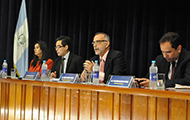
 Guatemala, March 25, 2011. A number of former presidents around the world have been sentenced on charges of corruption, illicit enrichment, and fundamental rights violations, and there are other presidents currently being prosecuted.
Guatemala, March 25, 2011. A number of former presidents around the world have been sentenced on charges of corruption, illicit enrichment, and fundamental rights violations, and there are other presidents currently being prosecuted. 